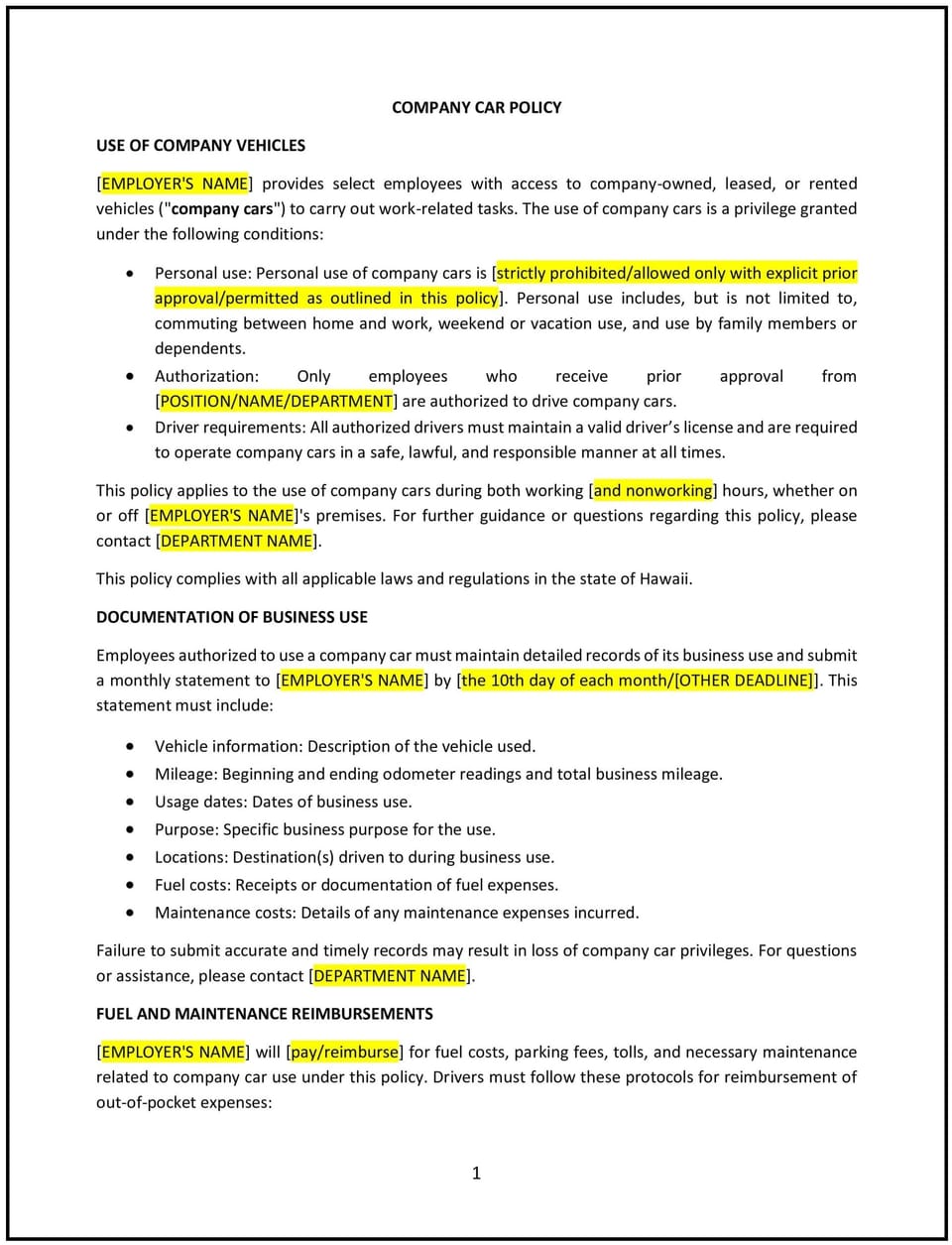Company car policy (Hawaiʻi): Free template

Company car policy (Hawaiʻi)
A company car policy helps Hawaiʻi businesses establish guidelines for providing vehicles to employees for work-related purposes. This policy outlines eligibility, usage rules, maintenance responsibilities, and reimbursement procedures, while addressing Hawaiʻi-specific considerations, such as local traffic laws and environmental concerns. It is designed to promote safe and efficient vehicle use, reduce liability, and support business operations.
By implementing this policy, businesses in Hawaiʻi can ensure clear expectations, protect company assets, and provide employees with the tools they need to perform their jobs effectively.
How to use this company car policy (Hawaiʻi)
- Define eligibility: Specify which employees are eligible for a company car, such as those with frequent travel requirements or specific job roles.
- Outline usage rules: Provide guidelines for using company cars, including restrictions on personal use, mileage limits, and geographic boundaries.
- Address maintenance responsibilities: Clarify who is responsible for routine maintenance, repairs, and cleaning, and outline procedures for reporting issues.
- Establish insurance requirements: Require employees to maintain valid driver’s licenses and ensure company cars are covered by appropriate insurance policies.
- Include environmental considerations: Encourage fuel-efficient driving practices and consider offering hybrid or electric vehicles to align with Hawaiʻi’s sustainability goals.
- Set reimbursement procedures: Specify whether employees will be reimbursed for fuel, tolls, or other expenses related to company car use.
- Communicate the policy: Share the policy with employees during onboarding and through internal communications to ensure awareness and understanding.
- Train employees: Educate employees on the policy’s guidelines, including safe driving practices and proper vehicle maintenance.
- Review and update the policy: Regularly assess the policy’s effectiveness and make adjustments as needed to reflect changes in laws, business needs, or environmental priorities.
Benefits of using this company car policy (Hawaiʻi)
This policy offers several advantages for Hawaiʻi businesses:
- Promotes safe driving: Clear guidelines and training help reduce accidents and liability risks associated with company car use.
- Protects company assets: Establishing rules for maintenance and usage ensures company cars are well-maintained and used appropriately.
- Supports business operations: Providing vehicles to employees with travel requirements improves efficiency and productivity.
- Reduces costs: A structured policy helps control expenses related to fuel, maintenance, and insurance.
- Encourages sustainability: Including environmental considerations aligns with Hawaiʻi’s commitment to sustainability and reduces the business’s carbon footprint.
- Enhances employee satisfaction: Offering company cars as a benefit can improve employee morale and retention.
- Ensures compliance: The policy helps businesses align with Hawaiʻi traffic laws and insurance requirements.
Tips for using this company car policy (Hawaiʻi)
- Communicate the policy effectively: Share the policy with employees during onboarding and through regular reminders, such as emails or training sessions.
- Provide training: Educate employees on safe driving practices, maintenance responsibilities, and the policy’s guidelines.
- Monitor usage: Regularly review mileage logs, maintenance records, and insurance documents to ensure compliance with the policy.
- Be transparent: Clearly explain the policy’s purpose, benefits, and expectations to employees to build trust and cooperation.
- Consider sustainability: Offer hybrid or electric vehicles and encourage fuel-efficient driving practices to support Hawaiʻi’s environmental goals.
- Review the policy periodically: Update the policy as needed to reflect changes in laws, business needs, or environmental priorities.
Q: Why should Hawaiʻi businesses adopt a company car policy?
A: Businesses should adopt this policy to promote safe driving, protect company assets, and support employees with travel requirements.
Q: Who is eligible for a company car?
A: Eligibility should be clearly defined in the policy, typically including employees with frequent travel requirements or specific job roles.
Q: What rules should businesses set for company car use?
A: Businesses should outline usage rules, such as restrictions on personal use, mileage limits, and geographic boundaries, to ensure appropriate use.
Q: Who is responsible for maintaining company cars?
A: The policy should clarify whether employees or the business is responsible for routine maintenance, repairs, and cleaning.
Q: What insurance requirements should businesses consider?
A: Businesses should ensure company cars are covered by appropriate insurance policies and require employees to maintain valid driver’s licenses.
Q: How can businesses promote sustainability with company cars?
A: Businesses should consider offering hybrid or electric vehicles and encourage fuel-efficient driving practices to align with Hawaiʻi’s environmental goals.
Q: How often should the policy be reviewed?
A: The policy should be reviewed annually or as needed to reflect changes in laws, business needs, or environmental priorities.
This article contains general legal information and does not contain legal advice. Cobrief is not a law firm or a substitute for an attorney or law firm. The law is complex and changes often. For legal advice, please ask a lawyer.


